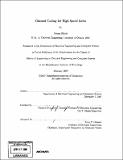Channel coding for high speed links
Author(s)
Blitvic, Natasa
DownloadFull printable version (14.85Mb)
Other Contributors
Massachusetts Institute of Technology. Dept. of Electrical Engineering and Computer Science.
Advisor
Vladimir Stojanovic.
Terms of use
Metadata
Show full item recordAbstract
This thesis explores the benefit of channel coding for high-speed backplane or chip-to-chip interconnects, referred to as the high-speed links. Although both power-constrained and bandwidth-limited, the high-speed links need to support data rates in the Gbps range at low error probabilities. Modeling the high-speed link as a communication system with noise and intersymbol interference (ISI), this work identifies three operating regimes based on the underlying dominant error mechanisms. The resulting framework is used to identify the conditions under which standard error control codes perform optimally, incur an impractically large overhead, or provide the optimal performance in the form of a single parity check code. For the regime where the standard error control codes are impractical, this thesis introduces low-complexity block codes, termed pattern-eliminating codes (PEC), which achieve a potentially large performance improvement over channels with residual ISI. The codes are systematic, require no decoding and allow for simple encoding. They can also be additionally endowed with a (0, n - 1) run-length-limiting property. The simulation results show that the simplest PEC can provide error-rate reductions of several orders of magnitude, even with rate penalty taken into account. It is also shown that channel conditioning, such as equalization, can have a large effect on the code performance and potentially large gains can be derived from optimizing the equalizer jointly with a pattern-eliminating code. Although the performance of a pattern-eliminating code is given by a closed-form expression, the channel memory and the low error rates of interest render accurate simulation of standard error-correcting codes impractical. This work proposes performance estimation techniques for coded high-speed links, based on the underlying regimes of operation. (cont)It also introduces an efficient algorithm for computing accurate marginal probability distributions of signals in a coded high-speed link.
Description
Thesis (S.M.)--Massachusetts Institute of Technology, Dept. of Electrical Engineering and Computer Science, February 2008. Includes bibliographical references (p. 139-144).
Date issued
2008Department
Massachusetts Institute of Technology. Department of Electrical Engineering and Computer SciencePublisher
Massachusetts Institute of Technology
Keywords
Electrical Engineering and Computer Science.